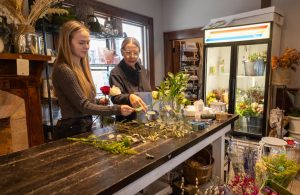Faculty, students express concerns about 2020 enrollment goal
November 10, 2019
Parking during football game weekends, navigating the bus schedule and making an appointment at the counseling center could all become more challenging in coming years due to enrollment growth. App State’s total enrollment goal is projected to increase student population more next year than it has the previous nine.
App State Faculty Senate Chair and history professor, Michael Beherent, presented concerns from faculty and students, regarding the increased enrollment plan for the 2020-21 school year to the Student Government Association. The concerns include parking, housing and academic and non-academic resources available for students and faculty.
The total enrollment for fall 2019 is 19,280 and the target enrollment for fall 2020 is 20,000 or more students. From 2010 to 2019, the number of first-year students grew from 2,829 to 3,501, a 672 person increase. The proposed enrollment number will increase the student population by 720 undergraduate and graduate students in one year, Megan Hayes, associate vice chancellor and chief communications officer wrote in an email.
At the Oct. 3 Faculty Senate meeting, associate vice chancellor for enrollment management Cindy Barr said first time, full time student enrollment would increase by 850 to 4,351.
Beherent said the increase is possible, but not guaranteed.
Megan Hayes, associate vice chancellor and chief communications officer, wrote in an email that there are categories of students with various enrollment goals; however, administration and admissions recognizes it is key to maintain “flexibility across those categories.” The categories include on campus, online and off campus students.
Meredith Ingram, a sophomore sustainable development major, said the plan “scares” her because of Boone’s small size.
Faculty members are concerned the increase will negatively impact funding for current students and faculty. They questioned the amount of resources available to achieve the enrollment goal, class sizes increasing and students’ ability to enroll in required classes, as it is already a competitive process.
However, “Chancellor Everts and Provost Kruger are committing resources to fund solid enrollment growth implementation plans to reach the 2020 goal,” Hayes wrote.
Beherent said faculty is worried about the ratio of faculty to students, the amount of non-academic resources for students and the impact on the town of Boone.
“It kind of feels like they’re not valuing the students that are already here,” said Ella Fowler, sophomore English major.
She said students and faculty already face parking and housing issues.
“I have heard nothing about expanding the Counseling Center, and that’s already a huge issue. It’s not about the (quality of the) counselors we have; it’s about the number of counselors we have,” Fowler said.
Hayes said at App State students “have never been ‘numbers’” and admissions offers admission to “well-qualified, successful students.”
“In the general sense, I think everybody is a little concerned about stretching the facilities beyond their maximum,” said Andy Koch, vice chair of Faculty Senate.
Beherent suggested SGA members and students pose questions to administration about the effect on current students and faculty. He said administrators need to know how students feel so they can be successful and thrive at at App State.
During the Oct. 29 SGA meeting, Destiney Houghtalen, director of Academic Affairs, offered to set up meetings with the SGA senators to dissect the issue. She also offered to include Institutional Research, Assessment and Planning and admissions in the conversation.
Aiyana Willoughby, sophomore class senator, asked if scholarships would become more competitive.
“My understanding is that scholarships are seen as key to increasing enrollment,” Behrent said.
He said scholarships are used to attract students and increase the likelihood for students to strongly consider App State as their first choice.
Beherent said the rationale for the push to enroll 20,000 students is “primarily with the issue of the university’s funding and with the university stature.”
He said compared to other North Carolina public universities, App State is underfunded. Behrent said the administration thinks increased admission will help App State “be taken more seriously as a larger and more prestigious institution,” especially by Raleigh, the center of state government, and Chapel Hill, the core of the UNC school system.
“App’s not equipped to take in more people as of right now. Maybe in a couple years,” Maci Koester, sophomore chemistry major said.












Lin • Nov 15, 2019 at 3:59 pm
Please listen to your students. 850 more students won’t make us more respectable. We are not UNC or Chapel Hill for a reason and we shouldn’t try to be something else than what App State is. I came here for personal interaction and closeness to faculty and peers. I’ve seen that decrease over my 4 years here. There’s other ways to bring funding in besides bodies. If you looked at your staff and students that you have already, you could capitalize off of what your good at. Also, pay your staff more and they’ll work harder and bring in more money or the salaries alone my bring in higher qualified professors. Know what programs excel and help them out so they can help you. And please, care about the locals. You’re effecting their lives too in this tiny town that now takes twice as long to go through with the extra people. There’s no room for more people, bigger is not always better. If you tried harder, you’d find a better way.
Sandro • Nov 13, 2019 at 7:22 pm
It would be different if App State had the money to expand to become this big. But we don’t have the money. Faculty are terribly underpaid compared to what faculty at our peer institutions are paid. We don’t have office space or classroom space– in fact, there is now a big push to deliver online the courses that are normally taught in person on campus. So students will pay top dollar to come to App for the supposedly close relationships with faculty only to sit in their dorm room and take a class over their computer. And those classes that will still be face to face will be bigger than ever before. Students are being ripped off if you ask me.
Jesse McAdams • Nov 11, 2019 at 12:34 pm
This explains why I was kicked off campus and I can’t get in classes that I need. So much for the idea this is a student-friendly campus.